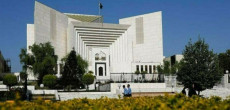[vc_row][vc_column][vc_column_text dp_text_size=”size-4″]
On Monday, Justice Mansoor Ali Shah of the Supreme Court issued a dissenting opinion regarding the court’s September 15th decision to nullify amendments to the accountability laws and reinstate corruption cases against public office holders. In his 27-page dissenting statement, Justice Shah pointed out that the accountability laws applied to members of the armed forces and judges.
He mentioned that during more than 50 hearings, a question arose about whether judges of the constitutional court and members of the armed forces were exempt from the NAB Ordinance.
In response, Justice Shah firmly rejected the widely held belief and asserted that both members of the Armed Forces and judges of the constitutional courts were fully subject to the NAB Ordinance, just like any other public servant in Pakistan.
Also Read: Supreme Court Cancels NAB Ordinance Amendments
The initial decision on September 15 was announced by a three-judge bench, with a 2-1 majority, in response to a petition brought by the PTI chairman, challenging amendments made to the NAB laws by the previous coalition government of the Pakistan Democratic Movement (PDM).
Justice Mansoor Ali Shah emphasized that courts should base their decisions on the law and the Constitution, even when public sentiment is against them. He stressed the principle of the “trichotomy of power,” stating that no state organ could claim superiority over the others.
He objected to the majority verdict and explained that Pakistan’s Constitution is founded on the separation of powers, where the legislature, executive, and judiciary have distinct functions. Each organ is independent in its designated sphere and cannot encroach upon the others’ functions.
Regarding the objections to the amendments raised by the PTI chairman, Justice Shah argued that the right to hold elected public officeholders accountable through criminal prosecution under the NAB Ordinance was not an inherent part of fundamental rights to life, dignity, property, and equality.
He found the petitioner’s arguments lacking and dismissed the case.
Justice Shah clarified that the amendments made by the parliament merely changed the forums for investigating and trying corruption cases involving amounts or properties less than Rs500 million. These cases would now be handled by anti-corruption investigating agencies and anti-corruption courts instead of the NAB Ordinance.
He asserted that this was a legislative matter outside the court’s jurisdiction and that the amendments did not infringe on fundamental rights guaranteed by the Constitution.
[/vc_column_text][/vc_column][/vc_row]











